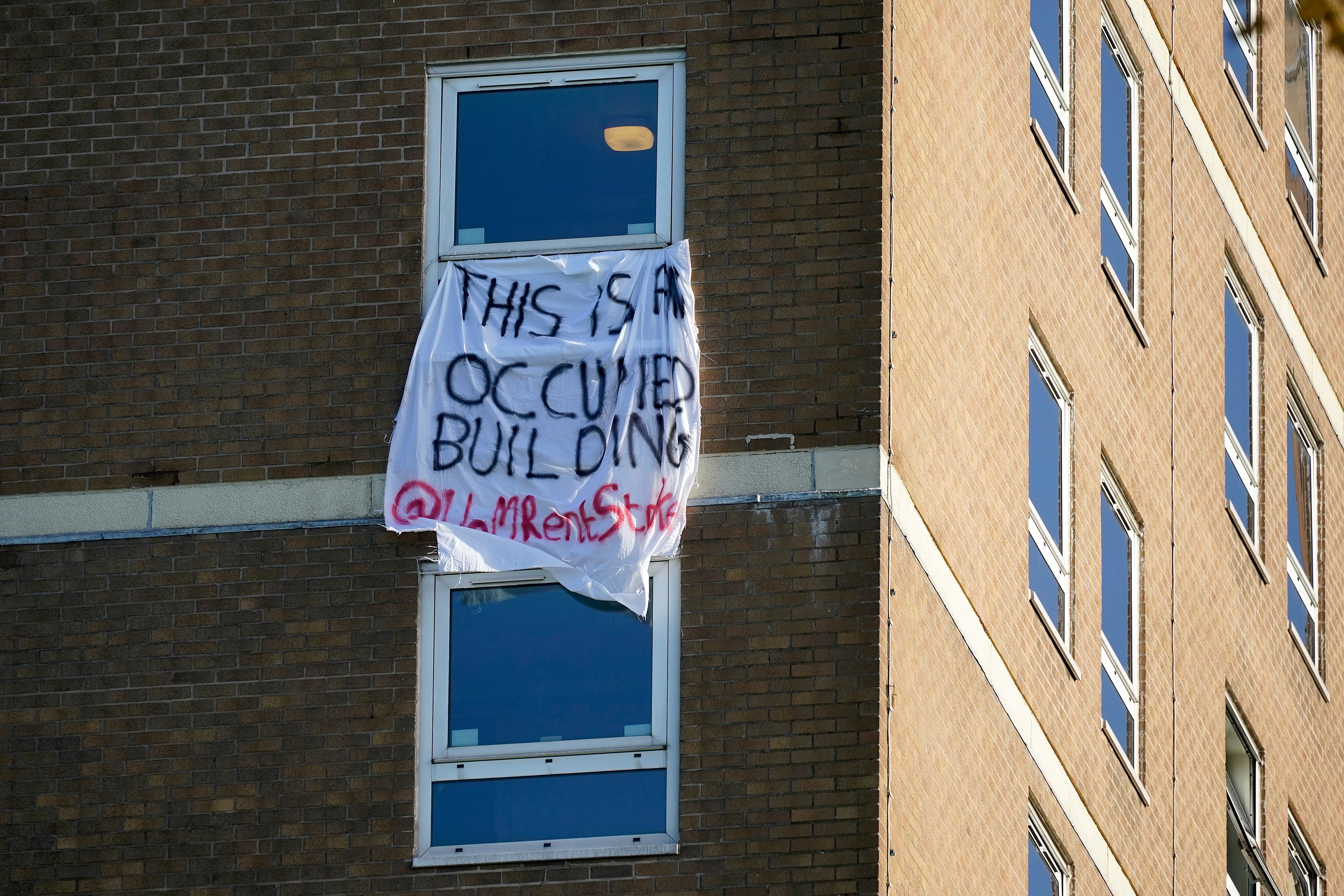‘Not good enough’: Rent strikes continue at universities despite lockdown concessions
'A lot of people do not feel comfortable coming back to a Covid hotspot — and yet we have to continue paying contracts,' one student tells Zoe Tidman


As England was plunged into lockdown earlier this month, many students were told to stay put while away from their term-time accommodation.
While universities have responded with different forms of support — including waiving fees — rent strikers across the country continue pushing for more concessions during the pandemic.
While Nottingham Trent University has said residents of university-operated accommodation no longer have to pay rent if away during lockdown, the rent strike group set up by students now wants to see discounts for the thousands in private accommodation too.
Lewis Tibbs, its co-founder, is calling for students to be allowed to leave accommodation contracts without being penalised.
Those who decide to stay should be granted a 40 per cent rent reduction across the year, he adds — especially important for those that were “forced to stay” in accommodation because of lockdown.
“Following that announcement, a lot of students couldn’t get home,” the 22-year-old says.
“A lot of them are isolated and lonely,” Tibbs, a final-year-student adds. “They don’t have access to facilities or services as they normally would. So it’s quite tough.”
Around 500 students at Nottingham Trent have signed up for the strike starting this term, he says.
The university is encouraging other large accommodation providers and private landlords to follow its lead in waiving rent.
“Without government support students will remain reliant on the goodwill of private accommodation providers and landlords to do the right thing,” it said in a statement, adding it will “continue to press government for national action”.
University of Manchester students are also planning a second rent strike this academic year, after receiving 30 per cent off the current term — which runs until the end of January.
The university said students living in university accommodation will not have to pay any rent until national lockdown ends or they return.
However, first-year Barnaby Fournier says he does not know anyone at home claiming that rebate, as many had already returned to university at the start of January.
For those on campus, the rent strike group will continue their demand for 30 per cent reduction until restrictions are eased, he says.
“Because of restrictions, the student experience isn’t the same as it usually is. We’re still striking for those reasons — reduced facilities and everything," he adds.
“Our bar on campus, which is meant to be subsidised from our rent, is still closed," Fournier notes.
The University of Manchester said students in halls will get a six-week rent reduction for the first term, which runs until the end of January. After that, students will pay the full rate unless they leave — they can cancel their licence agreement and only be charged up until the date they return keys or choose not to return.
Over in Lancaster, the university has offered students unable to return to on-campus accommodation a £400 “goodwill” payment towards their rent — which it said, taken along with the rent repayment last summer term, would bring the total returned to students during the pandemic to £10m.
However, Lancaster’s rent strike group said the latest move was “an insultingly low offer” and vowed to keep witholding payments.
“£400 is nothing compared to the 70 to 100 per cent reductions which were won for students last year,” the group tweeted.
The university’s vice-chancellor said in a letter to students that most of Lancaster’s accommodation was operated by a company called UPP.
“The University is contractually obliged to transfer the full rent from accommodation whether students are able to be in residence or not and thus the full impact of the goodwill payment is being borne by the University,” professor Andy Schofield said.
Meanwhile, all Queen Mary University of London (QMUL) students in university-owned accommodation can get a 30 per cent rent reduction for the full remaining term — which will run until the start of June in most cases — given the impact of lockdown.
But Luke Carter, a first-year student involved in the rent strike, says he wants to see the university go further.
He says other rent strike demands — including a committment of no job losses for staff and allowing people to leave accommodation contracts without getting hit by a penalty - have also not been met.
“A lot of people do not feel comfortable coming back to a hotspot of Covid in the middle of London — and yet we have to continue paying the contracts,” he tells The Independent.
Given the opportunity, he would prefer stay at home and leave his accommodation contract.
“Because of the amount of money it costs as well — it is almost my entire loan - and then not to have any work I can do while I’m there, it doesn’t work out financially at all,” Carter says.
A QMUL spokesperson said “most” undergraduates in university-owned accommodation had accepted the offer of 30 per cent off rent for the full remaining term. The university has made a “comparable offer” to postgraduates unable to return, and was working with partners to encourage private providers to offer similar support, they added.
Swansea University’s rent strike group said a reduction — covering the period from 4 January to mid-February — offered to students in university halls not able to return to coronavirus restrictions was “not good enough”.
“Students who do not feel comfortable returning at all MUST have access to full refunds for the remainder of the term,” they posted on social media. “Students who have already moved in MUST receive some sort of rebate from the university.”
A Swansea University spokesperson said: “We are working through the implications of the stay at home advice, which came from the government after some students had returned. To help with this, the university will not generate invoices for any students with university accommodation until May when we have been able to look at these cases.”
Over in Bristol, another rent strike plans to continue.
In light of England’s latest lockdown, Bristol University said students in university-owned accommodation unable to return will not be charged rent from the start of February until late March — if they have not spent a night there since 5 January.
Saranya Thambirajah, a first-year student, tells The Independent the group felt it was “quite unfair” the concession only applied to those away from university since early January.
“A lot of students had already moved back into hall when the university made this announcement,” she says, adding some would have chosen to stay at home otherwise.
Like other rent strikes, Bristol’s student acction was planned before lockdown. Students are calling for a 30 per cent rent reduction for the whole year.
Bristol University — who also faced a rent strike last term — estimates undergraduate students living in residences who have not returned for the current lockdown will receive around 25 per cent off rent for the whole year in light of other rebates, which it believes is “one of the most significant rebates across the university sector”.
Those who have returned to university-allocated accommodation will still benefit from a 30 per cent rebate from mid-December until 5 February, as well as a 10-day rebate last month.
“The overall package of additional Covid-related support for students in halls up to the end of March will total over £16.5m, including rent rebates, the provision of free food boxes to self-isolating students, cleaning supplies and laundry services," a university spokesperson said.
Michelle Donelan, the universities minister, said last week the government was encouraging universities and accommodation providers “to review their accommodation policies to ensure they have students best interests at heart”. She said the government was urging them to make policy “clear” and to be “fair”.









Join our commenting forum
Join thought-provoking conversations, follow other Independent readers and see their replies
Comments